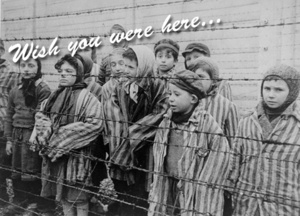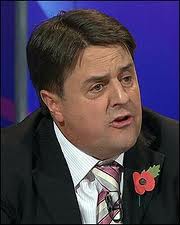Nazi Poetry
Nazi Poetry is the term applied to all non-prose literature written during Germany in the period of 1933-1945, as well as more recent works explicitly inspired by this period.
Like all soldiers, when not fighting, Nazis also made war poems. They were full of suppressed emotion and expressed how they missed their family. Their loves and fears are scrawled across the pages that now give us a better insight into how the war actually was. Nazi Poetry has helped many historians understand the thought process of their writers.
Nazi poems always rhymed, as Adolf Hitler once said: "To write non-rhyming poetry is the worst disgrace you could bring to your country. It is a foul Zionist thing to do! Kill the Jews! Kill the Jews!".
If a Nazi's poetry did not have a single rhyme, he was sent to the local concentration camp to manufacture orange juice. A lot of Nazi poetry is about very ordinary things like washing the dishes or watching the birds.
- Mein Land
- In my house, I lie.
- Safe and warm and dry.
- I hear my Führer cry.
- Everyone's a spy.
- I see my next door neighbour,
- He must die
By Heinrich Hamel
It was traditionally argued that the poem Mein Land was written in 1944, although recently historians have challenged this claim and suggested that it was written in 1945. The problem was sorted out when the famed historian John Tolan shouted after another big row between his peers "Who gives a fuck anyway?". During the war, Heinrich Hamel, the author of the poem, was a blacksmith (a person who creates objects from black people by using tools to hammer, bend, and cut them into shape) and therefore did not have to fight and spent most of his time alone at home. He was arrested on January 1, 1945 for breaking and entering his next door neighbour's house screaming "Mein Führer!" while stabbing his own blackened private parts with a bread knife.
Love letters[edit | edit source]
Most Nazis wrote to their family in poetic forms to show their love, as they could not reveal their emotions to their family directly. Many of the poems were found in German houses after the war. The poems were usually quite upsetting for people to read, so many of them have been burned by Jewish communities.
- My dearest, dearest, dearest wife,
- I fight for our family with gun and knife,
- And as I contemplate my chilling fate,
- I feel really sexy in these long Leather Trench coats they give us
- Lots of Love,
- Ted
By Ted Himmlerschun
Ted Himmlerschun survived the war and went on to be the greatest bin man of the twentieth century. He had four children and seven grand children. When looking back on the war in 1986, he told an interviewer: "We may have been murderous savages, but we had really cool coats. I mean come on! You've got to give us that." The book sold more than two hundred copies, giving Himmlerschun enough money to start his own waste removal service in 1992. Himmlerschun died aged 74 in 1994 from a sexual experiment that involved covering himself in leather and suffocating.
- Dear mother,
- Gran and brother,
- Many English, I have killed,
- All their blood and guts I've spilled,
- I miss you more and more
- I wish they'd finish this god damn war
- Mother I miss your homemade bread
- And the way father strokes my head
- I wish that I could be back with you all
- Saluting Hitler and doing fuck all
By Joseph Schumacher
Critics have said that this poem offers us a very realistic depiction of war. It has been featured in many films such as "Schindler's list" and "The Boy in the Striped Pyjamas". It came 17th in Dictator magazine's top 100 poems in 2009. It is unknown if Schumacher survived World War Two, or if he even lived long enough to send the letter. It was found in a French house alongside a homemade white flag and a rubber dildo (It is unknown if the objects are related).
Hitler's Own Hand?[edit | edit source]
One of the most famous pieces of Nazi poetry is The Happy Poem.
The Happy Poem
- Wine and flowers
- Happy Flowers
- I like flowers
- Turtles are cute
- Everything is wonderful
- Primrose and violets
- On my lawn
- While engulfing me with their
- Engaging scents
- Rendering me unconscious
By Anonymous
Nobody knows who wrote this poem or when it was written, but many people believe that it was found on a page that was ripped out of Adolph Hitler's own notebook. The original poem is kept in the Museum of Nazi Poetry in Poland.
Modern Nazi poetry[edit | edit source]
Modern Nazis have explored poetry to a suitably thorough extent. The poetry has been adapted into many hit pop songs such as Papa The Nazi and Fairytale of Auschwitz. Neo-Nazi poetry has not become as popular as the leaders thought it would but you can buy them at all good book stores. Neo-Nazi poetry is also the first type of Nazi poetry not to rhyme.
- Bloody Foreigners
- Do my views offend you?
- How I feel about the world
- You think that I am evil
- And that I should die
- Why does no-one like me?
- I am spat on in the street
- I want to help the country
- While Immigrants bring it to its knees
- Bloody Foreigners
By Nick Griffin
Nick Griffin had to apologise publicly for this poem as many other Neo-Nazis pointed out that the poem wasn't really about Nazis. "He was just whining about himself. That's not our way," said a spokesperson for the National Nazi Club. It was due to this poem that Griffin has been cast out of British society.
Holocaust Apology[edit | edit source]
Many Nazis did not agree with the mass murder of the Jews and they made songs and poems about how they felt...
- Anti-Concentration-Camp Song
- Kill the Jews
- Kill the Jews
- Kill the motherfucking Jews
Conclusion[edit | edit source]
So as you can see, not all Nazis are Jew hating scumbags. Some are caring, loving people who were just on the wrong side of a war. Nazis are not all evil. They're just like you or me. So I guess the moral of this article is don't judge a Nazi by his actions, judge him by his poetry instead, as that is what really counts.

